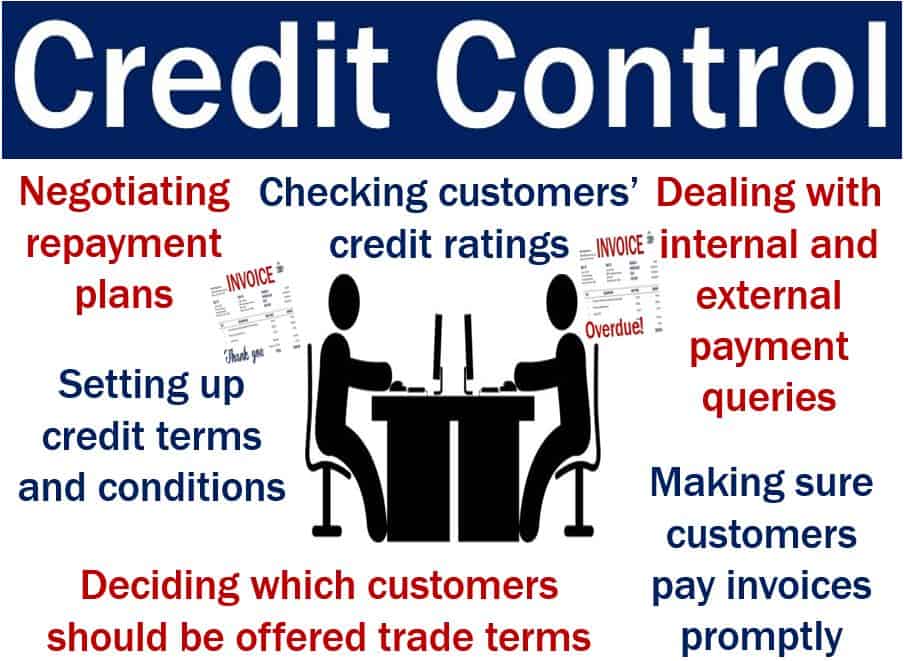Credit control – definition and meaning
Credit Control is a company department that determines how much credit to offer customers. It is also responsible for chasing up late payers. Put simply; credit control is in charge of trade credit and recovering unpaid debts.
Trade credit refers to allowing buyers to pay at a later date. For example, if you allow a customer to pay thirty days after the invoice date, there is a trade credit arrangement. Most arrangements are for thirty, sixty, or ninety days.
Effective credit control not only safeguards the company’s assets but also builds trust with clients by encouraging transparent and responsible borrowing.
In a small company, credit control may be the responsibility of just one person. In large companies, the department may have sub-sections. For example, there may be dispatch approvals, credit limit approvals, and collections sub-sections.
For businesses to succeed, they need to make sure their customers pay them. If invoice payments come in very late, or not at all, a company can soon become illiquid.

Credit control boosts sales
A well-run credit control department can boost sales by offering credit to selected customers. It also minimizes the number of bad debts. For example, it can make sure that customer’s with poor credit ratings or histories pay their bills up front.
Credit control is a crucial part of running a business. It is especially important for new companies that do not have much cash.
Hundreds of thousands of start-up companies across the world go bust every year. Many of them are highly profitable.
However, customers owe them a lot of money. If customers don’t pay them, they cannot pay suppliers, and eventually have to shut down.
According to Cambridge Dictionaries Online, credit control is:
“The system used by a business to make certain that it gives credit only to customers who are able to pay, and that customers pay on time.”
The credit controller
We call people who work in credit control credit controllers. They decide whether to loan money to a customer. They also manage current debts.
Credit controllers might work either on commercial credit or consumer credit. Commercial credit and consumer credit mean lending to companies and individual people respectively.
Below are some of the main duties of a credit controller (data source: totaljobs.com)
- checking customer’s credit ratings,
- deciding which customers may be offered credit, and under what terms (e.g. how much),
- setting up the credit terms and conditions,
- dealing with internal queries regarding payments,
- making sure customers pay their invoices promptly, and
- negotiating repayment plans.
Qualities of a good credit controller
Ask any entrepreneur or CEO about good credit controllers, and many will tell you they’re not easy to find. Let’s look at some of the skills you must have to succeed in credit control:
-
Communication skills
More than just chasing payments, you need to judge character effectively, adapt your communication style, listen sympathetically, and guide conversations towards resolution.
-
Persistence
Persistence pays off in credit control. Establish a system to ensure that every late payer is contacted regularly, whether in writing, by phone, or, if cost-effective, through personal visits.
-
Keep your cool
If you lose your temper, express anger, or come over as too aggressive, you could scare the other person away, which will make it much harder to recover any money. They could also resort to lying.
-
IT skills
Good credit controllers must know how to use specific IT systems regarding business activities, especially payments and terms of trade.
-
Numeracy
As you will be dealing with invoice amounts and people’s finances, you should be good with numbers.
-
Negotiation skills
You will need to negotiate payment terms and conditions that align with the company’s policies while also accommodating the customer’s situation. A skilled negotiator is more likely to reach amicable solutions that maintain customer relations and improve the likelihood of payment.
Factoring
Factoring, a type of financing in which a company buys your invoices, is useful if you require working capital.
The factoring company also assumes all the credit control duties. This is great for small companies because they can free up staff to focus on other aspects of the business.
The integration of advanced software solutions in credit control allows for real-time monitoring of credit risks and automated debt recovery processes, enhancing efficiency.
Two Educational Videos
These two interesting videos come from our sister channel on YouTube – Marketing Business Network. One explains what “Credit Control” is, and the other is all about “Credit.” Both videos use easy-to-understand vocabulary and examples.
-
What is Credit Control?
-
What is Credit?

